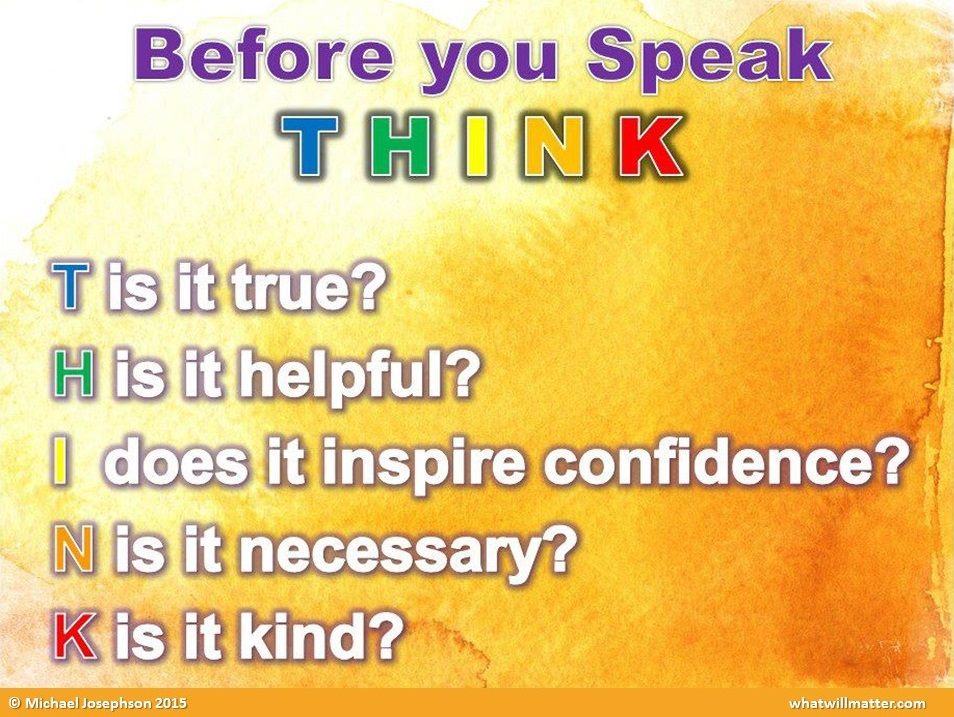Communication is the cornerstone of human interaction, yet it is often fraught with misunderstanding and conflict. The Bahá’í Faith, a spiritual and ethical framework founded by Bahá’u’lláh in the 19th century, offers profound principles that can guide individuals toward more meaningful dialogue. One such teaching emphasizes the crucial necessity of introspection before speaking. This article explores the multifaceted Bahá’í principle of “Before You Speak – Ask the Questions That Matter,” by delving into the foundational teachings, practical applications, and the impact of thoughtful communication.
To commence, let us ponder a playful yet profound question: “Have you ever considered that the words you choose can either bridge relationships or build barriers?” This inquiry not only challenges us but compels us to reconsider the very essence of our communication. In a world saturated with noise, the act of speaking can easily become automatic, leading to a disconnection from the true purpose of our words. Thus, the Bahá’í teachings advocate for a paradigm shift—transforming mere utterances into purposeful dialogue.
Central to this discourse is the first question to ask oneself: “Are my words truthful?” The concept of truthfulness is paramount in Bahá’í ethics. It invites individuals to reflect deeply on the nature of their statements. Are they grounded in reality, or are they embellished tales masquerading as facts? By honing the ability to discern truth from falsehood, individuals foster trust and respect in their conversations. This practice requires not just self-honesty but also a commitment to justice, as articulated in the teachings. Consequently, the Bahá’í Faith posits that truthfulness fosters an environment where dialogue can thrive.
The next question invites contemplation of intentions: “Am I acting with compassion?” Intentions significantly influence outcomes. When we speak from a place of empathy, we cultivate connections that transcend superficial differences. The Bahá’í writings encourage individuals to approach others with an open heart and a desire to understand their perspectives. This necessitates active listening and a willingness to engage sincerely. Such an approach nurtures an atmosphere ripe for collaboration and understanding, rather than one of contention or misunderstanding.
Furthermore, the question of timing emerges: “Is now the right moment to express my thoughts?” The efficacy of communication is not solely contingent upon the content but also on the timing of its delivery. The teachings stress the importance of patience and discernment—recognizing that certain discussions may be more constructive in different settings or moments. Engaging in challenging topics during inappropriate circumstances often leads to misunderstanding. Hence, waiting for the right moment can enhance receptiveness and understanding.
In addition to these inquiries, the Bahá’í perspective urges individuals to consider the potential impact of their words: “What will be the repercussions of my speech?” Every utterance carries weight, and words can have lasting effects on others’ lives. The teachings emphasize the eternal nature of the soul and the interconnectedness of humanity, suggesting that what we say can ripple through the lives of others. This awareness instills a sense of responsibility, compelling speakers to choose their words with care and foresight.
Another vital question concerns the context within which we communicate: “Am I mindful of the audience?” Awareness of the audience not only promotes suitability in language and tone but also respects the diverse backgrounds and experiences that shape listeners’ interpretations. The Bahá’í doctrine calls for an inclusive approach to discourse, ensuring that every voice has the opportunity to be heard. Acknowledging the unique perspectives of others fosters mutual respect and enriches the conversation.
Pragmatically, implementing these questions may seem daunting, yet it is through practice that such introspection can become second nature. The Bahá’í teachings encourage individuals to incorporate regular reflection into their daily lives. Maintaining a journal to analyze specific interactions can provide clarity on how one’s words align with their values. This practice can illuminate areas for growth and cultivate greater efficacy in communication endeavors.
Moreover, community building is an essential aspect of the Bahá’í Faith. Engaging in communal discussions grounded in these principles can amplify their potential. By practicing these questions collectively, communities can forge stronger bonds, embolden individual voices, and create platforms for inclusive deliberation. Additionally, celebrating diverse perspectives enshrines unity amidst diversity, a cornerstone of Bahá’í teachings. Through collaborative dialogue, communities can address challenges and seize opportunities for collective progress.
In conclusion, the Bahá’í exhortation to consider our words thoughtfully is a profound reminder of the power inherent in communication. By asking the pertinent questions before we speak—about truthfulness, compassion, timing, impact, and audience—we are empowered to transform our interactions. In this era of divisiveness and superficial exchanges, embracing these principles fosters an environment of understanding, healing, and communal growth. Ultimately, in a world that often prioritizes volume over substance, the Bahá’í teachings beckon us to become stewards of meaningful dialogue, illuminating pathways toward unity and progress.
